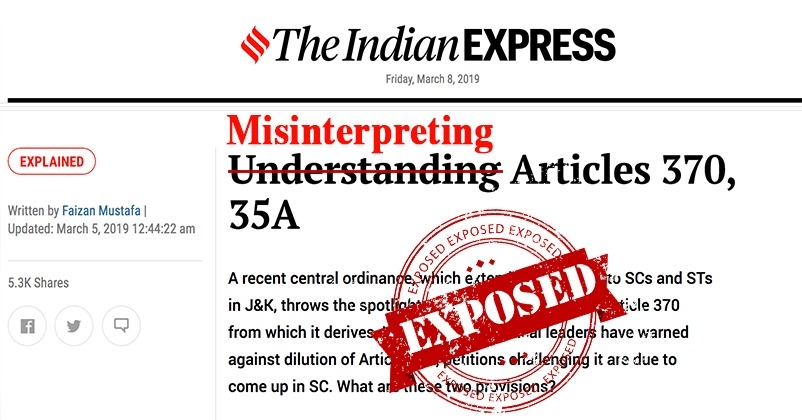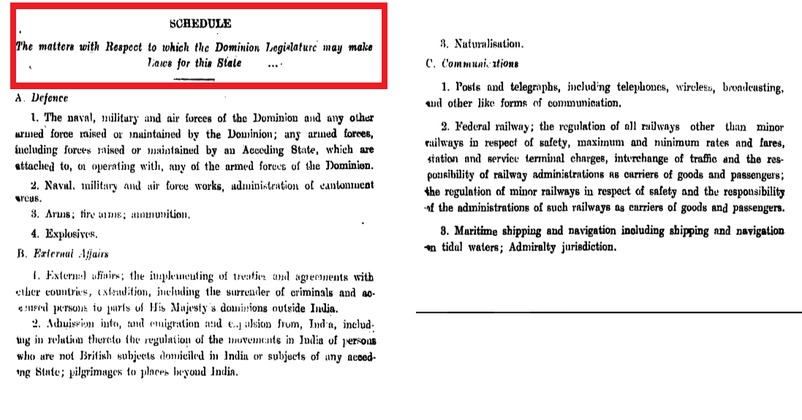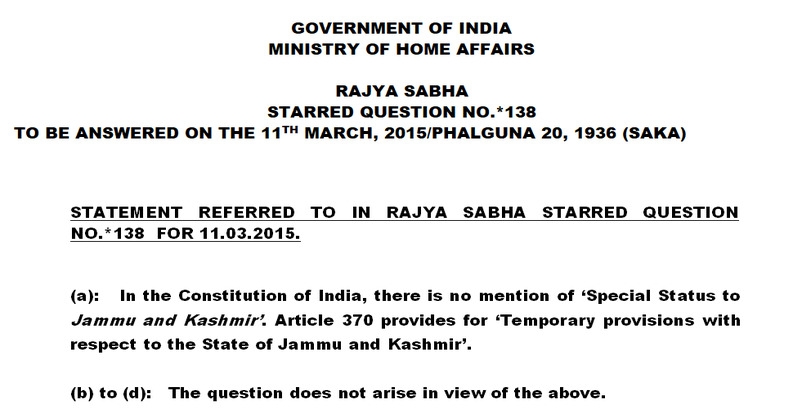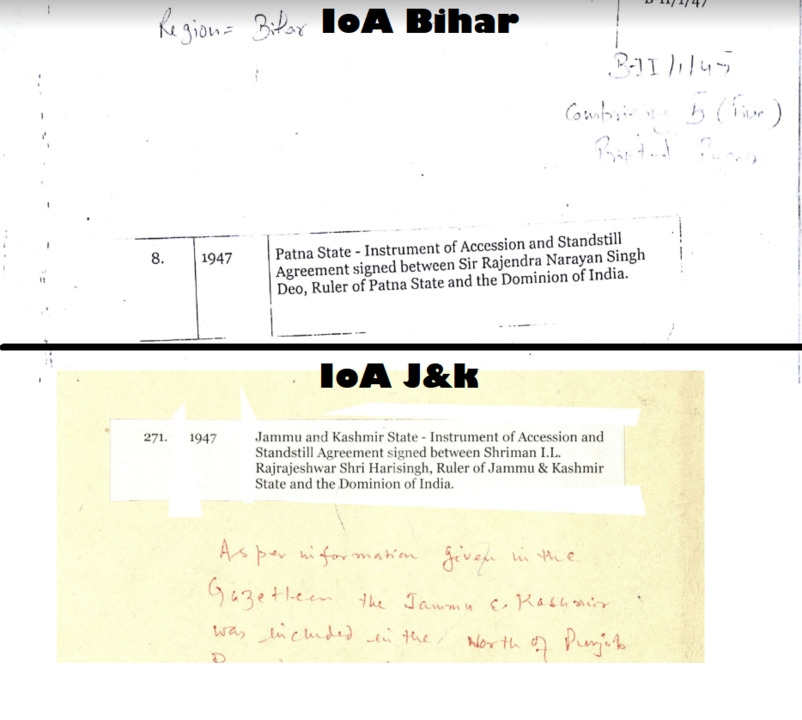On March 5, 2019 Indian Express published an article on Art. 370 and 35 A, “Understanding Articles 370, 35A” written by Mr. Faizan Mustafa, V.C. (NALSAR University). Ironically, though written by the Vice Chancellor, also a professor of Law, it was full of factual errors and misinterpretation of Constitutional provisions.
So, we decided to present the facts in public domain with point by point correction of this misinterpretation of Indian constitution published by non-other than Indian Express, allegedly one of the most popular news papers!
Jammu and Kashmir is an integral part of India but certain tumultuous conditions in the State in 1947 led to some temporary arrangements. This temporary arrangement was in the form of Article 370, which was inserted in the constitution of India to deal with situations prevailing in Jammu and Kashmir since 1947. This provision was supposed to be in effect till the situation in Jammu and Kashmir normalized and after returning to normalcy, this provision was to be abrogated. But this provision has continued till date and a few people with their limited understanding and vested interest started creating myth around it. Ironically, they see it as an opportunity to build their own discourse on false presumptions instead of the facts. The Article published in Indian Express is also one such selective opinion that spreads lies. Therefore, our article would break the fallacy that has been created through Indian Express:
1) Indian Express- A recent central ordinance, extends reservation to SCs and STs in J&K
Fact : Extension of Reservation to SCs and STs in J&K is done by a Constitutional Order (C.O.) and not by an Ordinance. It is actually under Art. 370 (1) (d) of the Constitution of India that C.O. was passed and benefits of reservation were extended to J&K, whereas the power to issue an Ordinance by President is provided under Art. 123. Both the provisions are completely different from each other
2) Indian Express- Article 370 exempts J&K from the Indian Constitution.
Fact : It is completely wrong to suggest that J&K is exempt from Indian Constitution, the fact is that more than 250 articles of Indian Constitution presently are applied in J&K and the rest would also be applied in due course.
3) Indian Express- The Act provided for three options: to remain an independent country, join Dominion of India, or join Dominion of Pakistan
Fact : Princely States had only two options either to accede to India or to Pakistan. Independence was out of question for Indian Princely States because two independent dominions were already in existence. The same could be found in Indian Independence Act, 1947 and The Government of India Act, 1935 as both the statutes were in application in the year 1947.
4) Indian Express- Though no prescribed form was provided, a State so joining could specify the terms on which it agreed to join.
Fact : The accession of the princely states was to be done by using a common Instrument of Accession (IOA) (See White Paper on Indian States, Appendix 7, Pg. 165) and it is wrong to suggest that a State could make changes in the Standard IOA. The Instrument of Accession for the State of J&K was same as that of any other State like Patna State and Mysore State. The conditions of surrendering three subjects like Defence, External Affairs and Communication to Dominion of India was the same for all the States, executing the Instrument of Accession. (See File no. P-I/20/47 (for J&K), B-II/1/47 (for Patna), M/II/1/47 (for Mysore) National Archives). Hence, the claim that no prescribed form was provided for Instrument of accession is clearly wrong.
5) Indian Express- A number of other states enjoy special status under Article 371, from 371A to 371I.
Fact : Here author suggests that State of J&K has a special Status under Article 370 and a number of other States enjoy this privilege too under Art. 371 (A-I). Though some states have been given the special status under Art. 371 (A-I) but it is misleading to suggest that the State of J&K is having Special Status under Art. 370. Nowhere in Article 370 the word “Special” is used, instead the marginal note to Art.370 categorically stipulates “Temporary provision with respect to the State of J&K”. If we look at the Constituent assembly debate on Art. 370, it becomes clear that this was a temporary provision which was to become ineffective automatically after the situation became normal. Author himself pointed that Pt. Nehru in Parliament said this provision will be slowly eroded on its own. Moreover Govt. of India in a reply in Parliament said “There is no mention of Special Status to J&K in constitution of India”. (See: Rajya Sabha Starred Question no. 138, March 11, 2015)
6) Indian Express- In Kashmir’s Instrument of Accession in Clause 5, Raja Hari Singh, ruler of J&K, explicitly mentioned that the terms of “my Instrument of Accession cannot be varied by any amendment of the Act or of Indian Independence Act unless such amendment is accepted by me by an Instrument supplementary to this Instrument”.
Fact : To begin with, it was not Kashmir’s Instrument of Accession (IOA) but the Jammu Kashmir’s IOA. In our common reference to State we sometimes call it Kashmir which is actually incorrect and the author has committed the same mistake at least six times in the article.
Furthermore, The Proclamation for the State of Jammu and Kashmir made by Yuvraj Karan Singh on November 25, 1949 states that the provisions of the Constitution of India “shall, as from the date of its commencement, supersede and abrogate all other constitutional provisions inconsistent therewith, which are at present in force in this State”. Hence, discussing only the text of the Instrument of Accession (IoA) signed by Maharaja Hari Singh in integration process is like using half-baked truth to spread lies
7) Indian Express- Raja Hari Singh had initially decided to remain independent
Fact : Maharaja Hari Singh tried to contact Indian leadership (particularly Pt. Nehru) even before signing the accession on multiple occasions. But the process of signing the instrument of accession got delayed because of Pt. Nehru’s insistence of handing over the reign of State to Sheikh Abdullah, who was an accused and had served prison term also for organizing anti National activities.
8) Indian Express- It was India’s stated policy that wherever there was a dispute on accession, it should be settled in accordance with the wishes of people rather than a unilateral decision of the ruler of the princely state.
Fact : Promise of obtaining the wishes of people by Lord Mountbatten in his reply to the signing of IOA by Maharaja Hari Singh was completely unwarranted. Legally, there was no condition in Instrument of Accession, that India has to ascertain the wishes of people under the statutory regime under which J&K became part of India. Ascertaining the wishes of people in J&K was India’s internal commitment to the people of State. And even if it is to be taken as a basis, Mountbatten suggested four options to ascertain the wishes of people in the matter of accession. These four options were referendum, plebiscite, election or even, if these methods are impracticable, by representative public meetings (Mission With Mountbatten by Alan Campbell-Johnson, p.263). India has already exercised the last two options, i.e. election in the state and representative public meetings, to ascertain the wishes of the people. Hence, people’s wishes were already ascertained decades ago.
9) Indian Express- Article 306A (now 370) was passed in the Constituent Assembly on May 27, 1949
Fact : The author has cited the wrong date on which Article 370 was discussed and inserted in the Constitution by Constituent Assembly. This article was inserted in Constitution of India on October 17, 1949 and not on May 27, 1949. Moreover, only Article 370 was drafted by N. Gopalaswami Ayyangar whereas rest of the constitutional provisions were drafted by the Constituent Assembly. Dr. Baba Saheb Ambedkar, the Chairman of the Constitution Drafts Committee, was not in favour of Article 370, as he considered it to be discriminatory. This gives clear indication about the difference in opinion in the Constitution Assembly over the issue of drafting constitutional provision on Jammu and Kashmir.
10) Indian Express- Delhi High Court in Kumari Vijayalaksmi (2017) too rejected a petition that said Article 370 is temporary …………………….thus, it is a permanent provision.
Fact : The issue of Article 370 and its existence is still a debatable issue. The Constitutional validity of Article 370 is presently under challenge in Apex court. On August 8, 2017 a notice has been issued to Union Government of India by Supreme Court. Thus, inference of the author on validity of Art. 370 is totally meaningless and futile. (See: SLP no. 19618/2017, Supreme Court)
11) Indian Express- Article 35A is unique in the sense ………. empowers the J&K legislature to define the state’s permanent residents and their special rights and privileges.
Fact : Article 35A is not unique but unconstitutional because it was neither presented to nor approved by Parliament of India, but clandestinely added to the Constitution of India. Article 370 does not give overwhelming power to the President to bypass Parliament and add any new provision in the Constitution, as was done in the case of Article 35 A. Under Article 370, the President of India is allowed to extend only those provisions, which are already available in the Constitution of India.




